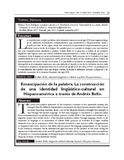Emancipación de la palabra. La construcción de una identidad lingüísticocultural en Hispanoamérica a través de Andrés Bello

Date
2019-07-01Author
Palabras Clave
Andrés Bello, identidad lingüístico-cultural, español, HispanoaméricaAndrés Bello, linguistic-cultural identity, Spanish, Hispanic America
Metadata
Show full item recordAbstract
Las convulsiones sociales y políticas del continente americano en el siglo XIX que surgieron luego de los diferentes movimientos independentistas que mantuvieron a Hispanoamérica unida a España por más de tres siglos, dejan una cicatriz en el pensamiento hispanoamericano que se intenta sanar a través de la lengua. En aquella época se considera la lengua como una cuestión más que comunicacional, identitaria y política. Andrés Bello es el pensador y artífice de un proyecto lingüístico que lograría crear una cultura realmente hispanoamericana a través de la lengua, gracias a su conciencia sobre la lengua en cuanto instrumento de la cultura. Bello propone en su Gramática de la lengua castellana dedicada al uso de los americanos (1847) que el español debía ser una unidad y que no sufriera un fraccionamiento, tal como sucedió con el latín. Y es que Bello no predicaba la independencia idiomática del español en el continente americano, sino que defendía el derecho y voz de los hablantes de esta orilla-tomando la expresión de Manuel Alvar en su trabajo El español de las dos orillas (1991)- en participar enla consolidación del español como una lengua común, al recibir la influencia europea y adaptarse a las realidades nacionales de la América Hispánica del siglo XIX.
Collections
Información Adicional
| Otros Títulos | Emancipation of the word. The construction of a linguistic-cultural identity in Spanish America through Andrés Bello |
| Correo Electrónico | monicatorresr@hotmail.com |
| Editor | SaberULA |
| ISSN | 1316-7189 |
| ISSN Electrónico | 2244-8799 |
| Resumen en otro Idioma | The social and political upheavals of the American continent in the nineteenth century that emerged after the different independence movements that kept Spanish America held to Spain for more than three centuries, leave a scar in the Hispanic-American thought that attempts to heal through the Spanish language. At that time language is considered as a question rather than communicational, an identity and political question. Andrés Bello is the thinker and architect of a linguistic project that would create a truly Hispanic-American culture through language, thanks to his awareness of language as an instrument of culture. Bello proposes in Gramática de la lengua castellana dedicada al uso de los americanos (1847) that Spanish should be a unit and not suffer a fragmentation, as happened with Latin. And it is that Bello did not preach the language independence of the Spanish in the American continent, but he defended the right and voice of the speakers of this bank, taking the expression of Manuel Alvar in his work El español de las dos orillas (1991), to participate in the consolidation of Spanish as a common language, receiving European influence and adapting to the national realities of Hispanic America of the nineteenth century |
| Colación | 43-50 |
| Periodicidad | anual |
| País | Venezuela |
| Publicación Electrónica | Entre Lenguas |
| Sección | Entre Lenguas: Artículos |





